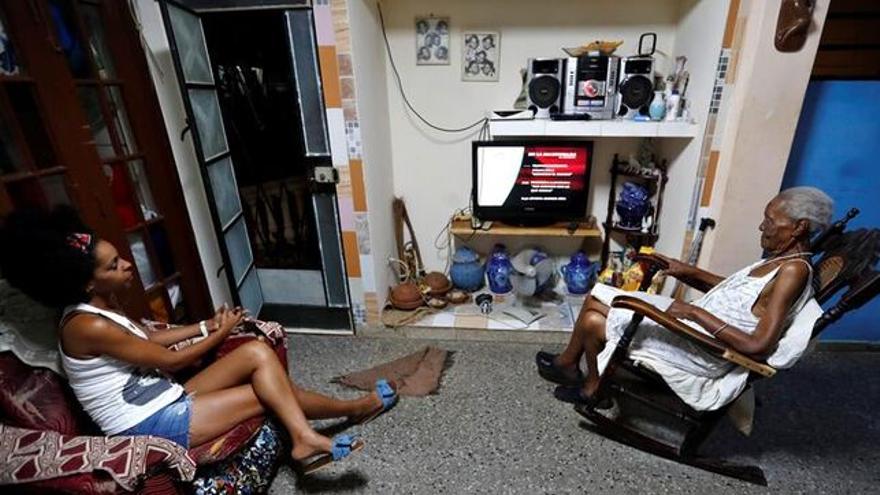
![]() 14ymedio, Havana, 23 April 2020 — Energy consumption has increased atypically in Cuba during this period of confinement. With the increase in the amount of time that citizens stay home, national electricity consumption has risen 10% despite the closure of some companies and large hotel facilities.
14ymedio, Havana, 23 April 2020 — Energy consumption has increased atypically in Cuba during this period of confinement. With the increase in the amount of time that citizens stay home, national electricity consumption has risen 10% despite the closure of some companies and large hotel facilities.
“Although sectors such as tourism and other non-essentials are declining, that hardly represents a decrease of 3% in consumption. That figure does not compensate for the increase seen in the consumption by Cuban households,” said Liván Arronte Cruz, Minister of Energy and Mines, reported yesterday on the Roundtable TV show.
According to Elaine Moreno Carnet, general director of the Office for the Rational Use of Energy, consumption is growing in the residential sector at the same time that large consumers are maintaining their usual activities, especially steel mills, light and chemical industries, and cement, agriculture, nickel and oil.
Cuban economist Elías Amor, resident in Spain, expresses his surprise at the official justifications. “No one explained that, for the same reason, the consumption of electricity in companies that have stopped or reduced operations, in hotels and in establishments in the budgeted sector must have plummeted since the beginning of the confinement. One would think that this drop in consumption should complement and even appear as a surplus, since industry, without going any further, is a more intensive consumer than are families.”
The argument is consistent with the electrical use pattern in Spain, where the fall in use by large consumers in March was 8.2%. Electricity demand fell between 5% and 10% in the first seven days of the state of alarm and, despite the increase in household consumption, the drop in services and industry led to a sharp decline during the first week of confinement, although in that country the confinement has been strict and the paralysis almost total, except in essential sectors.
The minister said yesterday that the Government has focused on ensuring consumption in hospitals or isolation centers, as well as essential activities, including some that are specifically needed at the moment, such as the production of calcium carbonate and salt, essential for cleaning supplies, and sodium chlorine and hypochlorite (i.e. bleach).
“The production plan for nickel is being met, while national oil production is exceeded, work in the mines is maintained and the refineries remain stable,” the minister explained. He added that there are maintenance works in several generating units to give greater stability to the national electricity system.
“The generation of electricity in Cuba works in a stable way, especially due to the effort made to maintain generation and avoid blackouts, amid difficult conditions imposed by the US blockade and the rise in consumption in homes as a result of the necessary social isolation,” he said, not forgetting the obligatory reference to Washington’s supposed responsibility for Cuba’s shortages.
The minister admitted that the heavy weight of diesel is a drag on the economy, because it is expensive and is used to generate more energy at peak demand. “If we need more diesel than planned, that conspires against other activities in the economy, such as transportation,” he added before invoking savings again, even though transportation is largely paralyzed.
Armando Cepero Hernández, general director of the Electricity Union of Cuba, downplayed the power outages that have occurred in recent weeks and insisted that they are a consequence of the increase in loads caused by more people staying at home, along with the effort to air condition rooms given the high temperatures of recent days.
The official notes that the offices to pay for electricity are closed but it is possible to make the payment electronically if you want to avoid the accumulation of bills. For those who do not, collections will be made when the epidemiological situation improves.
Moreno Carnet urged companies and households to consume responsibly, especially in the middle of the day, when greater peaks in demand are taking place.
For the economist Elías Amor, in addition to the problems of energy production in Cuba, there is the terrible state of the aerial networks and lines that cause continuous breakdowns, as a consequence of the lack of investments. “However, … the fault, in the event of the inevitable blackouts, lies with the Cubans, who leave their refrigerator door open or do not turn off a light bulb. The leaders are never responsible for the decisions they make, or don’t make.”
______________
COLLABORATE WITH OUR WORK: The 14ymedio team is committed to practicing serious journalism that reflects Cuba’s reality in all its depth. Thank you for joining us on this long journey. We invite you to continue supporting us by becoming a member of 14ymedio now. Together we can continue transforming journalism in Cuba.
